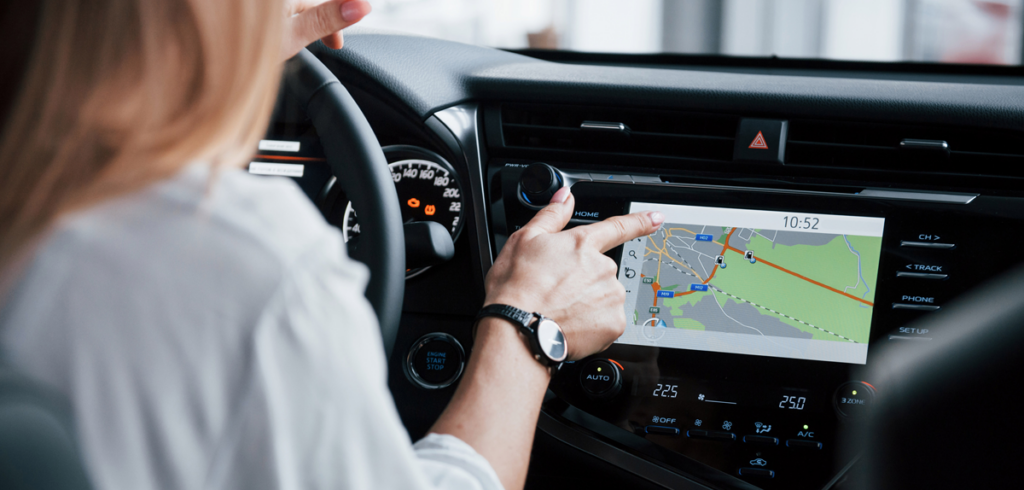Key Takeaways:
- GPS tracking enhances fleet efficiency by providing real-time vehicle location, optimizing routes, and improving dispatching.
- It significantly reduces operational costs through fuel savings, minimized vehicle downtime, and better maintenance scheduling.
- GPS tracking improves driver safety by monitoring driving behavior, enforcing Hours of Service (HOS) regulations, and enabling quick emergency responses.
- Enhanced security and asset protection are achieved by tracking valuable equipment and preventing theft through real-time monitoring.
- Customer satisfaction increases through accurate delivery estimates, improved communication, and reliable service performance enabled by GPS tracking data.
Table of Contents
How GPS Tracking Benefits Fleet Management and Business Growth
In 2018, a devastating wildfire swept through California, destroying homes and forcing evacuations. Firefighters used GPS tracking to monitor the fire’s movement, coordinate resources, and keep their crews safe. This real-time information was key to containing the blaze and protecting lives. This is just one example of how GPS tracking is used today.
But the impact of GPS tracking extends far beyond emergency response. It’s a powerful tool that’s transforming how businesses operate and manage their fleets. From improving efficiency and reducing costs to enhancing safety and boosting customer satisfaction, GPS tracking offers a wide range of benefits that can contribute to business growth and success.
What is GPS Tracking?
GPS tracking uses satellites orbiting the Earth to find the exact location of a device or object. This technology lets us track many things, from delivery trucks and valuable items to our phones and pets. Think of it as a virtual guide that shows you exactly where something is.
This location data can be viewed on a map in real-time, providing instant visibility into the whereabouts of your tracked assets. This technology has become indispensable for businesses and individuals seeking to improve efficiency, enhance security, and gain valuable insights into the movement of people, vehicles, and objects.
Why is GPS Tracking Important?
GPS tracking offers many benefits for businesses and individuals. It can help you:
- Improve efficiency by planning the best routes and reducing travel time.
- Enhance security by keeping track of valuable items and preventing theft.
- Gain peace of mind by knowing where loved ones or important items are.
Geosavi is a trusted provider of GPS tracking, offering a wide range of devices and services for businesses and individuals.
This guide will look at how GPS tracking works, what it can be used for, and the benefits it offers. We’ll also talk about how to choose a GPS tracking system and the laws about using this technology.

Decoding the Technology
GPS tracking may seem complex, but it’s based on simple principles. Let’s explore how it works:
The Science Behind GPS
To understand GPS, consider that if you know your distance from three different points, you can find your exact location. GPS uses a similar concept. It relies on a system of satellites orbiting Earth. Each satellite sends signals with its location and the current time.
A GPS tracker receives these signals. By measuring how long it takes for the signals to arrive from at least three satellites, the tracker can calculate its precise location. This is called trilateration.
From Signals to Maps
The GPS tracker sends its location information to a computer system. This system uses software to show the location on a map. This can be a simple dot on a map, or it can show the tracker’s movements over time, like a line on a map.
Leveraging GPS Tracking for More Than Just Location Data
GPS tracking can provide more than just location. It can also tell you:
Speed – How fast the object is moving.
Time – When the object was at a certain location.
Altitude – How high the object is.
This information can be useful for many things. For example, a company can use GPS tracking to see if their delivery drivers are taking the best routes.
Types of GPS Trackers
There are different types of GPS trackers. Some are small and good for tracking people or pets. Others are bigger and made for tracking vehicles or valuable items. The type of tracker you need depends on what you want to track.
GPS Tracking in Action
The applications of GPS tracking are vast and continue to expand as technology advances. From optimizing logistics and delivery routes to safeguarding valuable assets and ensuring personal safety, GPS tracking plays a vital role in various aspects of our lives. Its ability to provide real-time location data and historical movement information has made it an indispensable tool for businesses and individuals alike.
GPS tracking is used in many ways, from helping businesses to keeping people safe. Let’s explore some of the most common applications:
Boosting Fleet Efficiency Using GPS Tracking on the Road
GPS tracking is a game-changer for businesses that manage fleets of vehicles. Here’s how it helps:
Real-Time Tracking
See where your vehicles are at any moment. This helps with dispatching, routing, and responding to customers quickly.
Route Optimization
Plan the best routes for your drivers to save time and fuel. This means lower costs and faster deliveries.
Driver Safety
Monitor driver behavior, such as speeding or harsh braking. This helps improve safety and reduce accidents.
Improving Driver Safety with GPS Tracking Solutions
GPS tracking isn’t just for vehicles. It can also be used to track valuable assets, such as:
Construction Equipment – Keep track of expensive machinery and tools on job sites.
Shipping Containers – Monitor the location of cargo as it moves across the country or around the world.
High-Value Inventory – Protect valuable items in warehouses or during transport.
This helps businesses prevent theft, recover lost items, and improve security.
Protecting Your Drivers and Assets with GPS Tracking
GPS tracking can also be used by individuals for a number of reasons:
Personal Safety – People can use personal GPS trackers to stay safe when traveling alone or in unfamiliar areas.
Family Tracking – Keep track of family members, especially children or elderly relatives.
Pet Tracking – Find lost pets quickly with GPS trackers attached to their collars.
Adventure and Sports – Track your progress and location during outdoor activities like hiking, biking, or sailing.

Reaping the Rewards of GPS Tracking
GPS tracking offers many benefits for businesses and individuals. It helps you know where something is and use that information to improve efficiency, safety, and peace of mind.
Boosting Efficiency and Productivity
GPS tracking helps businesses make their operations smoother and more efficient. For example, delivery companies can use GPS tracking to plan the best routes for their drivers, saving time and fuel.
Construction companies can use it to track their equipment and make sure it’s being used effectively. Businesses can reduce wasted time searching for things or waiting for deliveries by knowing the location of their vehicles or assets.
This means employees can spend more time on productive tasks. GPS tracking helps businesses use their resources more effectively. A company can use GPS tracking to see which vehicles are closest to a job site and send the nearest one, saving time and fuel.
The Cost-Saving Power of GPS
By planning the best routes and reducing idling time, GPS tracking can help businesses save money on fuel. With better routing and scheduling, businesses can reduce the time employees spend on the road, which can lower labor costs.
Some insurance companies offer discounts to businesses that use GPS tracking because it can help reduce accidents and theft. GPS tracking helps businesses recover stolen assets quickly, which can save them from financial losses.
Enhancing Safety and Security
By monitoring driver behavior, such as speeding and harsh braking, GPS tracking can help promote safer driving habits and reduce accidents. GPS tracking can be used to monitor the location of employees who work alone or in remote areas, providing more safety. GPS tracking helps deter theft and recover stolen assets, improving security for businesses and individuals.
Improving Customer Experiences
By planning the best routes and providing real-time location updates, businesses can make deliveries more quickly and efficiently. GPS tracking allows businesses to give customers accurate estimated arrival times, improving communication. With GPS tracking, businesses can keep customers informed about the location of their deliveries or service technicians, improving communication and satisfaction.
Finding Your Perfect GPS Match
With so many GPS tracking options available, choosing the right one can be a challenge. This guide will help you find the perfect fit for your needs.
Defining Your Tracking Needs
Before you start looking at GPS tracking systems, figure out what you need. Consider these questions:
- What do you want to track? Vehicles, people, assets, or something else?
- What is your budget? GPS tracking systems have different prices depending on their features.
- What features are important to you? Do you need real-time tracking, geofencing, alerts, or reports?
Exploring Tracker Options
There are different types of GPS trackers, each with its own strengths and limitations.
Vehicle trackers are designed to be installed in vehicles and provide detailed information about location, speed, and driving behavior. Asset trackers are often smaller and more portable, good for tracking valuable equipment, tools, or inventory. Personal trackers are small and lightweight, designed to be carried by people or attached to pets.
Essential Features to Look For
When choosing a GPS tracking system, consider these important features:
Real-Time Tracking – See the location of your tracked objects on a map in real time.
Geofencing – Set up virtual boundaries and get alerts when a tracker enters or leaves those areas.
Alerts – Receive notifications about important events, such as speeding, low battery, or entering a geofence.
Reporting – Get detailed reports about the tracker’s history, including location, speed, and other data.
Integration – Make sure the system can work with other software you use.
Complying with Fleet Regulations Through GPS Tracking
GPS tracking is a powerful tool, but it’s important to use it responsibly and legally. Here’s what you need to know:
Privacy Considerations
GPS tracking involves collecting location data, which can be sensitive information. 1 It’s important to respect people’s privacy and be transparent about how you use this data.
- If you’re tracking employees, be open about it. Let them know why you’re tracking them and what data you’re collecting.
- Get consent if needed. In some cases, you may need to get permission from people before you track them.
- Use the data responsibly. Only use the data for legitimate business purposes. Don’t share it with others without permission.

Regulations and Best Practices
There are laws and rules about using GPS tracking. These laws are different depending on where you are and how you use the tracking. For more information, refer to the Electronic Frontier Foundation’s guide on location privacy. Here are some general guidelines:
Employee Monitoring – If you’re tracking your employees, make sure you understand the laws in your area. Some places have rules about when and how you can track employees.
Data Privacy – Protect the data you collect. Keep it secure and don’t share it with others without permission.
Vehicle Tracking – If you’re tracking vehicles, make sure you’re following the rules of the road and any specific laws about vehicle tracking in your area.
It’s always a good idea to talk to a lawyer if you have questions about the laws in your area.
Adopting GPS Tracking for Better Fleet Control and Results
GPS tracking has changed how we live and work. It helps us find our way, keep track of important things, and make our lives easier. For businesses, GPS tracking can improve efficiency, save money, and increase safety. It can help with things like managing deliveries, keeping track of equipment, and protecting valuable assets.
GPS tracking also offers peace of mind. Parents can use it to keep track of their children, and pet owners can find their lost furry friends. It can even help people stay safe when they’re traveling or doing outdoor activities.
As technology continues to improve, GPS tracking will become even more useful in our everyday lives. It’s a powerful tool that can help us connect with the people and things that matter most.
Efficient GPS Tracking Services to Optimize Your Fleet
At Geosavi, we’ve been helping businesses with their GPS tracking needs for years. We know this area well, so we understand what people here need. We can help, whether you’re a business tracking a fleet of trucks or a parent wanting to keep an eye on your child.
We care about our customers and want to help them find the best GPS tracking solution for their needs. We offer support and advice to help you use your GPS tracker effectively. We’re always here to answer your questions and help you in any way we can. Talk to us!